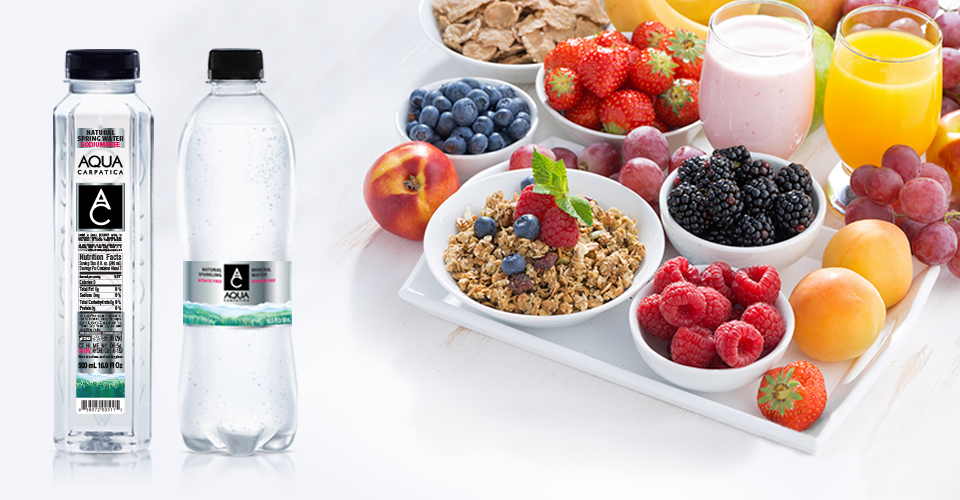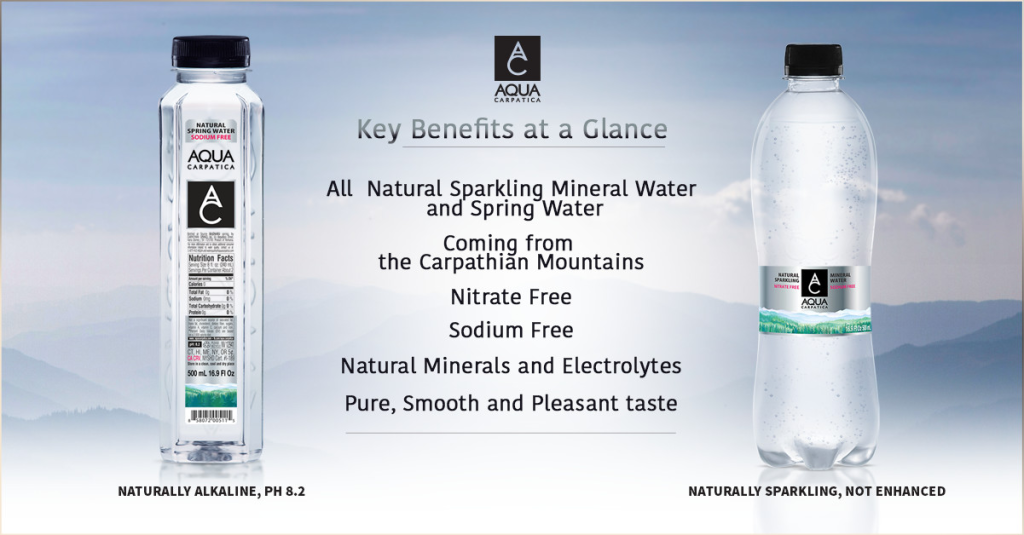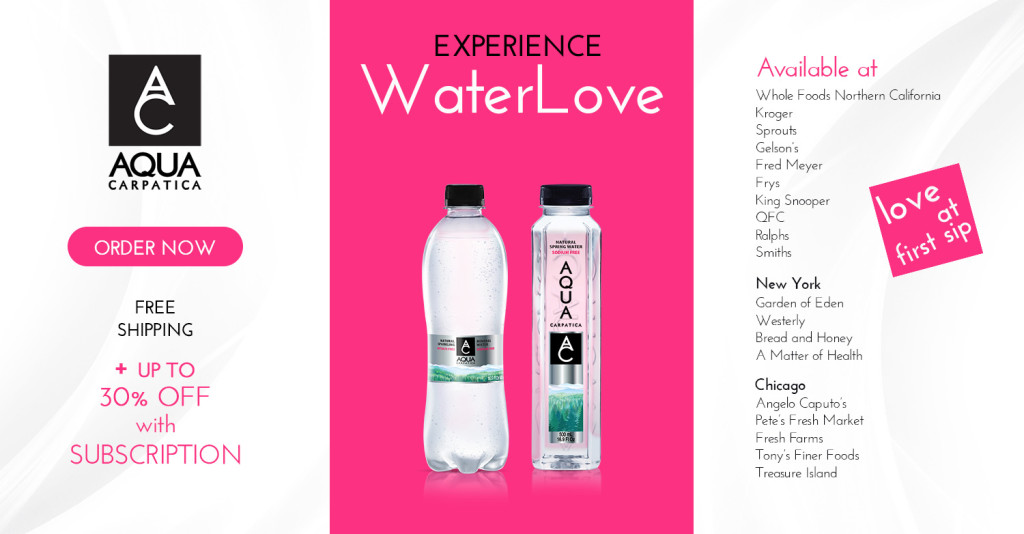We all like to eat well. We’re also careful to eat healthily.
It’s not only food – vegetable, fruits, dairy, meat – that we have to take into account when we’re looking for healthy life choices, but also beverages. Sugary, carbonated drinks, low-quality, excess alcohol, and artificial processed water are taking a toll on our bodies and also our taste-buds, influencing the way we season our food, silently prompting us to add extra sugar, salt and other harmful ingredients.
But have you ever thought about the major role that water plays in our diet? There is water and there is perfect water, because not all water is the same.
What is the perfect recipe for water? You will find it here.
The first important thing is that water should be natural. Not man made, not purified, not enhanced, but all natural and sourced from the Earth.
It is also important that it should come from a single source, a source that is verified and pure. Not from multiple sources, not blended, which means you can’t verify it.
For a rich and balanced taste, specialists and sommeliers have always recommended natural mineral water, either still or sparkling, to accompany and enhance the natural taste of food.
It is very important that the water you select to go with a fine meal should have a low sodium content, that it should have a balanced taste, and most importantly of all, that it should be really pure, with no traces of toxic of chemical waste in its composition.
Let’s take a look at the most important characteristics of good water:
Pure, no harmful chemicals
First of all, you want to drink pure water; you don’t want to drink fertilizers. Could that be possible in a bottled water? Yes, unfortunately, it might happen.
We don’t talk about them, they’re tasteless, odorless, they’re not listed on the label, but even so, they’re still present in water. What are they? Nitrates.
Chemical compounds used in agriculture, good for plants, but harmful to humans, nitrates are found in groundwater and aquifers. They exist in nature and they are used in agriculture. It is from their large-scale agricultural use that nitrates come to pollute aquifers, meaning that they end up in BOTTLED WATER.
They are tasteless, colorless and odorless. And no, they’re not usually listed on the label.
NITRATES are heavy oxidants. They are undesirable substances, harmful to human health.
The ingestion of a large quantity of nitrates may have serious consequences, including high blood pressure, thyroid and circulation problems, severe headaches, hives, blood poisoning, severe cyanosis, and, in the long term, even some types of cancer.
Infants are at greater risk than adults. In particular, infants less than six months old can become seriously ill if exposed to nitrates.
In many European countries, the legislation demands that the maximum nitrate limit in water for infants should be less than 2.27 mg per liter of NO3-N, while the adult limit is 11.3 mg per liter.
In the U.S. there is no specific regulation regarding nitrates and infants. There is a Maximum Contaminant Level of 10 mg/L of nitrate-nitrogen (NO3-N) in all waters.
Nitrates are harmful to babies, and they may also be harmful to pregnant women. There is a proven correlation between birth defects and high nitrate levels in expecting mothers. Researchers at Texas University have published a study that examines the relation between prenatal exposure to drinking-water nitrates and selected birth defects. They found that higher water nitrate intake was associated with several birth defects. The conclusion was that expecting and breastfeeding mothers should avoid drinking water with Nitrate levels greater than 2.27 mg of NO3-N per liter. For further reading, this is a link to the study.
AQUA Carpatica Natural Sparkling Mineral Water and Natural Spring Water are both NITRATE-free, perfectly pure and perfectly safe.
Less Sodium
Most mineral waters contain sodium to a greater or lesser degree.
The ideal water should be sodium-free.
As we know, salt, or sodium chloride, is a mineral essential for the body, but only in limited quantities, because otherwise there are certain risks, such as cardiovascular disease. Our modern diet contains alarming quantities of sodium, and so limiting the intake is essential for a healthy lifestyle.
Doctors recommend that people with high blood pressure or cardiovascular disease should consume water with a sodium content of less than 20mg per liter.
AQUA Carpatica Natural Sparkling Mineral Water has less than 5.3 m of sodium per liter, which, according to FDA regulations, means we can state “Sodium-free” on our label.
AQUA Carpatica Natural Spring Water is Sodium-free!
Naturally Sparkling Mineral Waters
There are naturally sparkling mineral waters and then there are artificially carbonated waters. While natural mineral waters are healthy, artificially carbonated waters can hurt your stomach.
How does this work?
Naturally sparkling waters occur in selected mineral springs and naturally contain calcium bicarbonate and magnesium bicarbonate.
The carbon dioxide (CO2) in naturally sparkling water stimulates the digestion and metabolism and gives a pleasant taste.
The high concentration of calcium and magnesium ions in naturally sparkling water produces a higher concentration of bicarbonate, creating health benefits such as improved digestion, prevention of kidney stones, and neutralization of the lactic acid produced during physical exertion.
ARTIFICIALLY carbonated water contains no natural bicarbonates.
Artificially added CO2 creates harsh conditions throughout the digestive system and actually increases the release of gastric acidity, ultimately leading to high blood pressure, ulcers, pressure on the diaphragm, and more.
In addition, artificial CO2 gives a bitter, sour, unpleasant taste.
AQUA Carpatica Natural Sparkling Mineral Water is naturally sparkling at the source, rather than enhanced, and it is one of the best sparkling mineral waters you can find anywhere in the world, since it is also exceptionally pure.
Minerals
More Calcium
There is natural water and then there is purified water.
Natural mineral or spring water contains minerals such as calcium and magnesium, and is unprocessed, untouched by technology.
Purified water no longer contains anything, and so in effect it is dead. Usually, it is just regular tap water, which has been purified.
Calcium is the mineral most common in the body and its highest concentrations are found in the bones, teeth, tendons, and nails, but it is also present in cell nuclei. Besides magnesium, we need calcium because it regulates the heartbeat, helps the nervous system, being a remedy against insomnia, and is essential for transmission of nerve impulses. Calcium is involved in multiple essential metabolic processes, such as blood coagulation, regulating the permeability of cellular membranes, limiting allergic processes, stimulating gastric secretion, metabolizing iron, efficient use of vitamin B12, and hormone release.
Among the diseases caused by the calcium deficiency are rickets, osteoporosis, osteomalacia, muscular spasms, light-headedness, weakness, insomnia, and irritability.
Doctors recommend a daily calcium intake of between 800 and 1200 mg for adults, derived from both food (dairy products, soy, tofu, hazelnuts, walnuts, broccoli, sardines, salmon) and natural sparkling waters.
AQUA Carpatica Natural Mineral Sparkling Water is rich in calcium content: one liter provides 24% of an adult’s recommended daily intake.
AQUA Carpatica Natural Spring Water contains 44.9 mg of calcium per liter, just enough for your daily calcium intake if you drink about two liters of water daily.
More Magnesium
Magnesium is essential for your health. It helps maintain both physical and psychological wellbeing because it plays an important role in metabolic processes such as the production of energy, acid and protein synthesis, muscle relaxation, prevention of diabetes and kidney stones, and metabolism regulation. Magnesium plays an important role in metabolizing Vitamin C and adjusting body temperature, but it is also a general regenerating factor since it delays ageing and strengthens the immune system.
Magnesium deficiency causes headaches, trembling, dizziness, insomnia, spasms, numbness and cramps, aching bones, allergies, decreased immunity, and general malaise.
The cardiac system is also affected by magnesium deficiency, as the mineral is essential for regulating the heartbeat.
Your required magnesium intake can be supplemented by a sparkling mineral water rich in magnesium.
Doctors recommend adults should have a daily magnesium intake of between 300 and 320 mg, derived from both food (cabbage, beet, plums, pumpkin seeds, bananas) and the natural mineral water.
One liter of AQUA Carpatica Natural Sparkling Mineral Water provides you with 16% of the daily intake of magnesium recommended for adults.
Great, smooth taste, no aftertaste
Because they are rich in minerals, if the balance is not ideal, mineral waters can be sweet or salty, sour or bitter, or just clean and pure, with a beautiful taste and no aftertaste.
The more calcium, the sweeter a water will be, the more magnesium, the bitterer it will be, the more sodium, the saltier it will be, while artificially carbonated water is sour.
Just the right amount of each ingredient will give an excellent taste, with no unpleasant aftertaste.
Did you know? Some water sommeliers recommend a specific type of water depending on the dish, temperature, time of the day, and occasion, just the same as a wine sommelier would.
Try AQUA Carpatica, and first of all you will be impressed by its beautiful taste.
It simply has a clean and wonderfully pleasant taste.
Still Water with a Natural pH
The term alkaline water refers to the pH of the water. The pH scale runs from zero to 14, with 7 as the neutral mid-point. Liquids with a pH of 1 are very acidic, and liquids with a pH of 13 are very alkaline. Human blood has a pH of approximately 7.4 and therefore it is slightly alkaline. It is essential that our bodies maintain our pH within a narrow optimal range.
Nowadays, it seems like everybody is saying that alkaline water is best for your metabolism, and it’s true. However, if water is artificially alkalinized (ionization using a process called electrolysis), it doesn’t mean it will actually do the job of alkalizing your body. The only thing that neutralizes acid is alkalinity, not the fact that water is alkaline. If water is alkaline, it doesn’t mean it has substantial alkalinity. There have to be alkaline minerals in the water to start with if it is going to achieve alkalinity.
In addition, the use of an ionizer doesn’t mean that your water is now better: the source remains an important part of water purity. Alkaline ionizers may even be unsafe, because they don’t remove contaminants.
So if you want to choose an alkaline water that will actually work when it comes to neutralizing gastric acid, it should have a naturally alkaline pH, provided by nature rather than by manmade devices.
AQUA Carpatica Natural Spring Water has a natural pH of 8.24.
Key Benefits at a Glance for the Perfect Water
- Natural Water, not processed or purified
- Coming from a verified, unique source
- Naturally Pure – very low content of Nitrates
- Low in sodium
- Natural Minerals and Electrolytes
- Smooth, pleasant taste
- Naturally Alkaline
If you love good food and try to eat as healthy, but as tasty as possible, AQUA Carpatica is now here to join your fine dining.








